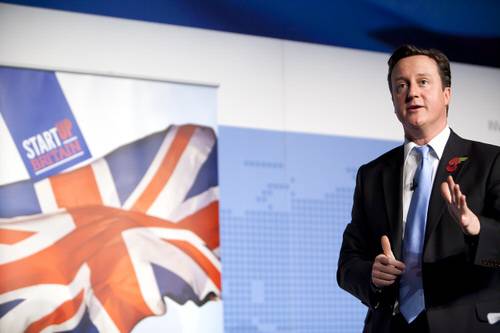
British Prime Minister David Cameron will enlist President Barack Obama’s help in accessing user info on Facebook and Twitter’s when the world leaders meet in the Oval Office on Friday, the Guardian reports. Good luck with that.
Cameron proposed on Monday banning encrypted messaging apps such as Snapchat, WhatsApp, Apple’s iMessage and FaceTime that are inaccessible to Britain’s Government Communications Headquarters (GCHQ) eavesdropping center. (Good luck with that, too.)
As the first world leader to meet with Obama following the Charlie Hebdo massacre, Cameron will ask the president to urge U.S. Internet companies such as Facebook and Twitter to surrender user communications upon request. “Comprehensive legislation” expanding electronic surveillance in the hunt for terrorists is a major part of Cameron’s re-election campaign. And it’s one he’s pushing to gain traction on following the terrorist attack on the Paris office of satirical newspaper Charlie Hebdo.
“The prime minister’s objective here is to get the U.S. companies to cooperate with us more, to make sure that our intelligence agencies get the information they need to keep us safe,” a U.K. government source told the Guardian. “That will be his approach in the discussion with President Obama–how can we work together to get them to cooperate more, what is the best approach to encourage them to do more.”
It’s an ambitious goal, given the ongoing revelations from Edward Snowden about the extent of government surveillance on U.S. citizens, as well as other world leaders. Since Snowden first shared classified information from the the National Security Agency (NSA), tech companies continue a public relations offensive to distance themselves from government interference. Published transparency reports detailing government requests for information are now de rigueur in Silicon Vally.
Last May, Facebook CEO Mark Zuckerberg detailed on his Facebook page a phone call he made to Obama to tell the president he is, “confused and frustrated by the repeated reports of the behavior of the U.S. government. When our engineers work tirelessly to improve security, we imagine we’re protecting you against criminals, not our own government.”
Whats more, Cameron’s requests run somewhat counter to Obama’s own call for tech security. On Monday, while Cameron demanded access to Snapchat and the like, Obama called for stronger cybersecurity laws in connection to data breaches, including the recent attack on Sony. The president also champions better communication between corporations and the government in detecting cyber threats.
Lead image courtesy U.K. Department for Business, Innovation and Skills

















